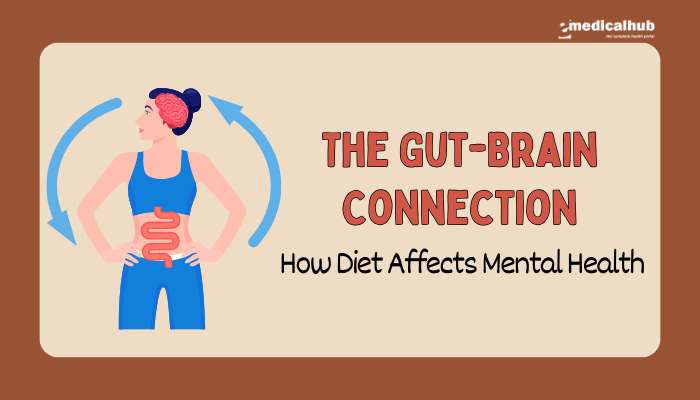Introduction
Our modern understanding of mental health increasingly recognizes the intimate relationship between the gut (particularly its microbiome) and the brain. Once thought to be entirely separate, emerging science suggests that what we eat can impact not only our digestive system but also moods, emotions, and even the development or severity of mental health conditions like depression and anxiety.
This interplay is often referred to as the gut-brain axis—a bidirectional communication network linking intestinal microbes, immune pathways, and neural signals with cognition and mood.

This article unpacks how diet influences our gut microbiota, how these changes can affect mental well-being, and offers practical tips for optimizing gut health to support a balanced mind.
From fermented foods and probiotics to the significance of fiber and healthy fats, you’ll discover how small dietary adjustments may yield outsized benefits for both your digestive function and emotional resilience.
Disclaimer: This information is for educational use only and does not substitute for medical advice. If you have a severe mental health condition or gastrointestinal issue, consult a qualified professional for personalized guidance.
Understanding the Gut-Brain Axis
What Is the Gut-Brain Axis?
The gut-brain axis describes the complex, bidirectional communication system between:
- The Central Nervous System (CNS): Primarily the brain and spinal cord.
- The Enteric Nervous System (ENS): A network of nerves in the gastrointestinal tract, sometimes referred to as a “second brain” due to its independent, extensive neural capabilities.
- Microbiome: Trillions of microorganisms (bacteria, fungi, viruses) residing in the intestines. Their metabolic byproducts can influence mood-related neurotransmitters and inflammatory responses.
This axis uses multiple pathways—neural (via the vagus nerve), hormonal, immune, and biochemical signals—to convey information back and forth.
Why It Matters for Mental Health
The gut microbiota plays a significant role in:
- Neurotransmitter Production: Certain gut bacteria can synthesize or modulate neurotransmitters like serotonin and GABA, which help regulate mood.
- Immune Regulation: Inflammation can shape brain health. Imbalances in gut flora can promote systemic inflammation, linked to conditions like depression.
- Stress Response: Chronic stress impacts the gut barrier and microbiota composition, potentially creating a feedback loop that worsens mental and digestive issues.
Thus, disruptions or poor composition of gut microbes may contribute to or exacerbate mental health disorders, while fostering a healthy microbiome can be supportive for emotional well-being.
The Role of Diet in Shaping the Gut
Microbiome Basics
Within the large intestine, beneficial microbes (e.g., Bifidobacterium, Lactobacillus) break down certain dietary fibers, produce short-chain fatty acids, and help crowd out harmful bacteria. A diverse, balanced microbiome is associated with better metabolic and immune function.
Foods That Hurt or Help Gut Health
- Refined Sugars and Processed Foods: High intake fosters the proliferation of harmful microbes, fueling inflammation.
- High-Fat, Low-Fiber Diets: May reduce beneficial bacterial species.
- Fruits, Vegetables, and Whole Grains: Rich in fiber, help beneficial bacteria thrive.
- Fermented Foods: Yogurt, kefir, kimchi, sauerkraut provide probiotics—live microbes that can bolster a healthy gut environment.
- Polyphenols: Found in berries, olive oil, and tea, these compounds may promote beneficial bacterial growth.
Gut Permeability and Brain Implications
A diet high in processed ingredients can increase gut permeability (“leaky gut”), allowing bacterial fragments and toxins to enter the bloodstream. This can trigger systemic inflammation, which influences brain pathways. Chronic low-grade inflammation has been linked to depression, anxiety, and cognitive decline.
Gut-Related Nutrients Affecting Mental Health
Fiber
Soluble and insoluble fibers feed gut bacteria (acting as prebiotics). They produce short-chain fatty acids such as butyrate, which can reduce inflammation and potentially promote a stable mood.
Omega-3 Fatty Acids
Commonly found in fatty fish (salmon, sardines) and some plant seeds (flax, chia), omega-3s may support healthy brain function and are often recommended to help moderate depressive symptoms.
Amino Acids
Foods high in certain amino acids contribute to neurotransmitter production—e.g., tryptophan helps synthesize serotonin, while tyrosine is needed for dopamine. A balanced diet including protein sources ensures availability of these building blocks.
Vitamins and Minerals
- B Vitamins (especially B6, B9/folate, B12): Vital for neurotransmitter production and brain health.
- Vitamin D: Low levels correlate with depression in some studies.
- Magnesium and Zinc: Deficiencies have been linked to anxiety and mood instability.
Emerging Research: The Psychobiotic Concept
Definition of Psychobiotics
“Psychobiotics” are probiotics (or beneficial bacteria) that, upon ingestion in adequate amounts, produce mental health benefits by acting on the gut-brain axis. Examples include certain strains of Lactobacillus and Bifidobacterium, found in fermented foods or targeted supplements.
Preliminary Findings
- Reduced Anxiety: Some small trials show people with mild-to-moderate anxiety notice calmer mood after consistent probiotic use.
- Stress Modulation: Animal and human studies suggest certain strains help lower stress hormone levels and might ease depressive symptoms.
- Need for More Research: Large-scale, long-term RCTs are needed for robust evidence, but the field is promising.
Selecting Probiotic or Prebiotic Supplements
If considering these for mental health support:
- Consult a Professional: Seek guidance on specific strains with evidence for mood improvement.
- Quality Assurance: Choose reputable brands ensuring viability of bacteria.
- Consistency: Gains (if any) typically appear after several weeks of daily use.
Practical Dietary Recommendations to Support Mental Health
Emphasize Whole Foods and Diversity
- Mediterranean-Style: Emphasizes fruits, vegetables, whole grains, legumes, fish, and olive oil. Observationally linked to lower rates of depression.
- Limit Ultra-Processed Items: Excessive sugar, refined carbs, or hydrogenated fats can disturb healthy gut flora.
Incorporate Fermented Foods
- Yogurt, Kefir: Containing live cultures. Check labels for “live and active cultures.”
- Kimchi, Sauerkraut, Miso, Tempeh: Rich in beneficial microbes or fermented compounds.
- Kombucha: A fermented tea. Some varieties contain beneficial bacteria, but watch sugar content.
Balanced Blood Sugar Levels
Frequent spikes and crashes in blood glucose can cause mood dips or irritability:
- Small Frequent Meals: Combine protein, fiber, and healthy fats.
- Low-Glycemic Carbs: Brown rice, quinoa, oats over pastries or sugary cereals.
Sufficient Protein and Healthy Fats
Proteins supply amino acids for neurotransmitters. Meanwhile, healthy fats (from fish, avocados, nuts) maintain cell membrane integrity in the brain, supporting signals that influence mood.
Lifestyle Synergies: Beyond Diet
Physical Activity
Regular exercise is a known mood booster, augmenting the gut-brain synergy:
- Increases Microbiota Diversity: Some studies show physically active individuals have more varied gut flora.
- Reduces Stress: Endorphin release complements dietary efforts in mental health maintenance.
Sleep Quality
Poor sleep disrupts both mental well-being and microbial balance:
- Maintain Routine: Consistent bedtime supports healthy circadian rhythms beneficial for gut processes.
- Avoid Late Heavy Meals: Can hamper sleep quality and hamper gut function.
Stress Management and Mindfulness
Chronic stress directly impacts gut microbiota composition. Mindfulness, yoga, or breathing exercises help mitigate stress hormones that can compromise gut integrity and trigger inflammatory cycles.
Special Considerations
Medication Interactions
If on antidepressants or anti-anxiety meds, dietary changes and probiotic supplements can be complementary. Always discuss with a healthcare provider to avoid conflicts (e.g., certain probiotic or herbal supplements may interact with medications).
Individual Differences
Gut microbiomes vary widely. Not all “healthy” diets have uniform mental health effects across individuals. Some may respond strongly to certain dietary modifications; others see minimal shifts. Genetic predispositions or concurrent health conditions also matter.
Gradual Approach
Overhauling your diet abruptly can cause gut discomfort or bloating (particularly if increasing fiber or fermented foods quickly). Gradual introduction and listening to your body’s feedback is wise.
Real-Life Scenarios and Examples
Mild Anxiety, Shift to Whole Foods
An office worker with mild anxiety decides to cut down on sugary snacks and incorporate daily salads, nuts, and kefir:
- Outcome: Over a few weeks, he notices fewer sugar crashes, steadier energy, and slight improvements in mood. Anxiety triggers remain but are less intense.
Postpartum Depression, Nutritional Support
A new mother facing postpartum blues works with a nutritionist to ensure adequate B vitamins, iron, and includes some fermented foods. Combined with therapy, she experiences an incremental uplift in mood and daily energy.
Stress-Related GI Issues
A university student with IBS-like symptoms and stress consults a dietitian. She tries a gentle probiotic, plus moderate fiber. While not a cure, her GI discomfort and anxious episodes reduce enough to improve overall quality of life.
Frequently Asked Questions (FAQ)
- Can just changing my diet cure depression or anxiety?
Diet can be a significant supportive tool, but it rarely acts as a standalone “cure.” Chronic or severe conditions usually require a multi-pronged approach—therapy, possible medication, stress management, and dietary improvements. - How long before I notice changes in mood from diet adjustments?
Some people sense incremental energy lifts or stable moods within weeks. Others may need months to see substantial changes. Microbiome shifts and neural adaptations often take time. - Are probiotic supplements always needed, or can I rely on food sources only?
If you regularly consume fermented foods and a fiber-rich diet, your microbiome likely benefits. Supplements can be helpful but are optional, especially if recommended by a professional for specific concerns. - Do gluten or dairy cause mental health issues for everyone?
Not necessarily. Some individuals with intolerances or allergies might see improvement avoiding them, but the general population may not be affected similarly. Personal observation or testing is key. - Is it safe to drastically change my diet if I have a current mental health condition?
Consult a medical or nutritional expert. Abrupt changes can cause side effects. A gradual, monitored shift is safer, especially if under mental health treatment.
Conclusion
The intricate gut-brain connection underscores that mental well-being isn’t solely a matter of psychology. What we eat profoundly shapes our gut microbiota, immune function, and neurotransmitter balance, all pivotal factors in how we think and feel. By favoring a diet abundant in whole, nutrient-dense foods—particularly fiber-rich produce, lean proteins, healthy fats, and fermented foods—we can help create an internal environment that supports emotional stability, resilience against stress, and potentially better mental health outcomes.
While adjusting your diet can be a meaningful step, it’s crucial to remember that mental health is multi-factorial. Nutrition complements—but doesn’t replace—other interventions such as therapy, medication (if needed), and stress management techniques. If you or someone you know experiences persistent depression, anxiety, or other mental health concerns, professional advice remains vital. Ultimately, harnessing the power of this gut-brain synergy can yield a more holistic approach to feeling well, bridging the nutritional and emotional realms for a healthier, more balanced life.
References
- Mayer EA, Tillisch K, Gupta A. Gut/Brain axis and the microbiota. J Clin Invest. 2015;125(3):926-938.
- Cryan JF, Dinan TG. Mind-altering microorganisms: the impact of the gut microbiota on brain and behaviour. Nat Rev Neurosci. 2012;13(10):701-712.
- Clarke G, Grenham S, Scully P, et al. The microbiome-gut-brain axis during early life regulates the hippocampal serotonergic system in a sex-dependent manner. Mol Psychiatry. 2013;18(6):666-673.
- Ng QX, Peters C, Ho CYX, et al. A meta-analysis of the use of probiotics to alleviate depressive symptoms. J Affect Disord. 2018;228:13-19.
- Slykerman RF, Hood F, Wickens K, et al. Effect of Lactobacillus rhamnosus HN001 in early life on the outcomes of ADHD. J Pediatr. 2017;183:167-173.e7.
- Jacka FN, et al. A randomized controlled trial of dietary improvement for adults with major depression (the ‘SMILES’ trial). BMC Med. 2017;15(1):23.
- Mao J, Tang L, Xie L, et al. The effect of diet on the gut microbiota and depression: A systematic review and meta-analysis. J Affect Disord. 2021;294:85-93.
- Macedo D, Filho AJMC, Soares de Sousa CN, et al. The role of inflammation in depression and fatigue. Front Immunol. 2017;8:1959.
- Kelly JR, Borre Y, C OB, et al. Transferring the blues: depression-associated gut microbiota induces neurobehavioral changes in the rat. J Psychiatr Res. 2016;82:109-118.
- Li N, et al. Probiotics and antidepressant therapy. Front Psychiatry. 2020;11:73.
- Rea K, Dinan TG, Cryan JF. The microbiome: A key regulator of stress and neuroinflammation. Neurobiol Stress. 2016;4:23-33.
- https://www.nimh.nih.gov




